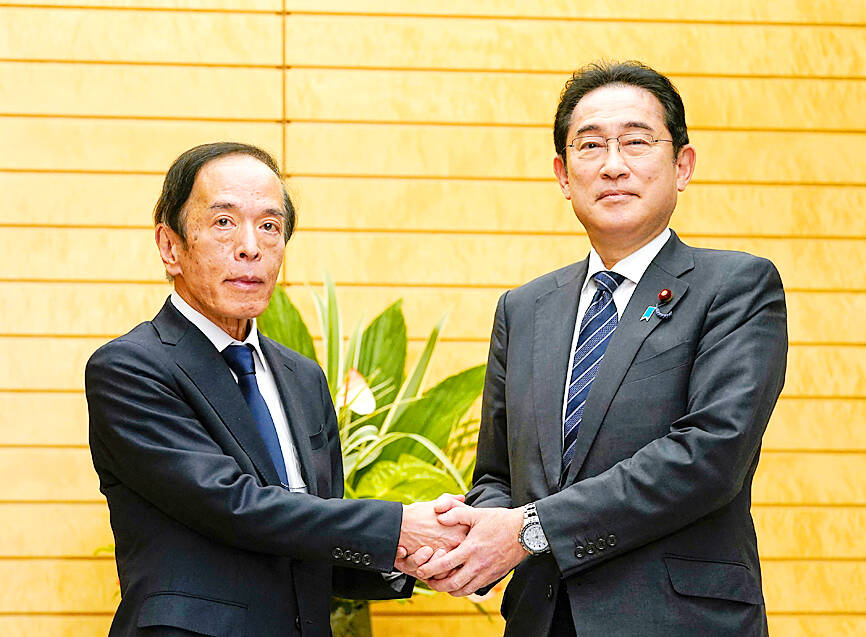Japan is set to approve Osaka as the nation’s first casino location, local media reported, marking a major step in ambitions of turning the country into an Asian gambling destination.
Japanese Prime Minister Fumio Kishida’s government is expected to sign off on the proposal submitted by local authorities for an integrated resort, including hotels and conference halls, scheduled to open in late 2029, Jiji news agency said yesterday.
Cabinet ministers would decide on the move as early as tomorrow, Jiji said.

Photo: AFP
However, delays in the screening process mean it might start operations much later.
Shares of gaming-related companies climbed in Tokyo.
Orix Corp, which has been working on the Osaka plan with MGM Resorts International, rose as much as 2.1 percent, while gaming machine producer Universal Entertainment Corp jumped 6.9 percent.
TOURISM FOCUS
Building a casino is key to the country’s hopes to capture resurgent tourism demand and double the number of foreign visitors compared with pre-COVID-19 pandemic levels to 60 million by 2030.
The Japanese government is slated to approve up to three integrated resort locations, with a rival bid submitted by Nagasaki Prefecture still under review, Jiji said.
According to the Osaka plan, the resort would be built on Yumeshima Island at an initial cost of ¥1.08 trillion (US$8.1 billion), seeking to attract an estimated 20 million visitors per year.
The companies would still need additional approval to operate the casino.

PERSISTENT RUMORS: Nvidia’s CEO said the firm is not in talks to sell AI chips to China, but he would welcome a change in US policy barring the activity Nvidia Corp CEO Jensen Huang (黃仁勳) said his company is not in discussions to sell its Blackwell artificial intelligence (AI) chips to Chinese firms, waving off speculation it is trying to engineer a return to the world’s largest semiconductor market. Huang, who arrived in Taiwan yesterday ahead of meetings with longtime partner Taiwan Semiconductor Manufacturing Co (TSMC, 台積電), took the opportunity to clarify recent comments about the US-China AI race. The Nvidia head caused a stir in an interview this week with the Financial Times, in which he was quoted as saying “China will win” the AI race. Huang yesterday said

Nissan Motor Co has agreed to sell its global headquarters in Yokohama for ¥97 billion (US$630 million) to a group sponsored by Taiwanese autoparts maker Minth Group (敏實集團), as the struggling automaker seeks to shore up its financial position. The acquisition is led by a special purchase company managed by KJR Management Ltd, a Japanese real-estate unit of private equity giant KKR & Co, people familiar with the matter said. KJR said it would act as asset manager together with Mizuho Real Estate Management Co. Nissan is undergoing a broad cost-cutting campaign by eliminating jobs and shuttering plants as it grapples

Japanese technology giant Softbank Group Corp said Tuesday it has sold its stake in Nvidia Corp, raising US$5.8 billion to pour into other investments. It also reported its profit nearly tripled in the first half of this fiscal year from a year earlier. Tokyo-based Softbank said it sold the stake in Silicon Vally-based Nvidia last month, a move that reflects its shift in focus to OpenAI, owner of the artificial intelligence (AI) chatbot ChatGPT. Softbank reported its profit in the April-to-September period soared to about 2.5 trillion yen (about US$13 billion). Its sales for the six month period rose 7.7 percent year-on-year

MORE WEIGHT: The national weighting was raised in one index while holding steady in two others, while several companies rose or fell in prominence MSCI Inc, a global index provider, has raised Taiwan’s weighting in one of its major indices and left the country’s weighting unchanged in two other indices after a regular index review. In a statement released on Thursday, MSCI said it has upgraded Taiwan’s weighting in the MSCI All-Country World Index by 0.02 percentage points to 2.25 percent, while maintaining the weighting in the MSCI Emerging Markets Index, the most closely watched by foreign institutional investors, at 20.46 percent. Additionally, the index provider has left Taiwan’s weighting in the MSCI All-Country Asia ex-Japan Index unchanged at 23.15 percent. The latest index adjustments are to